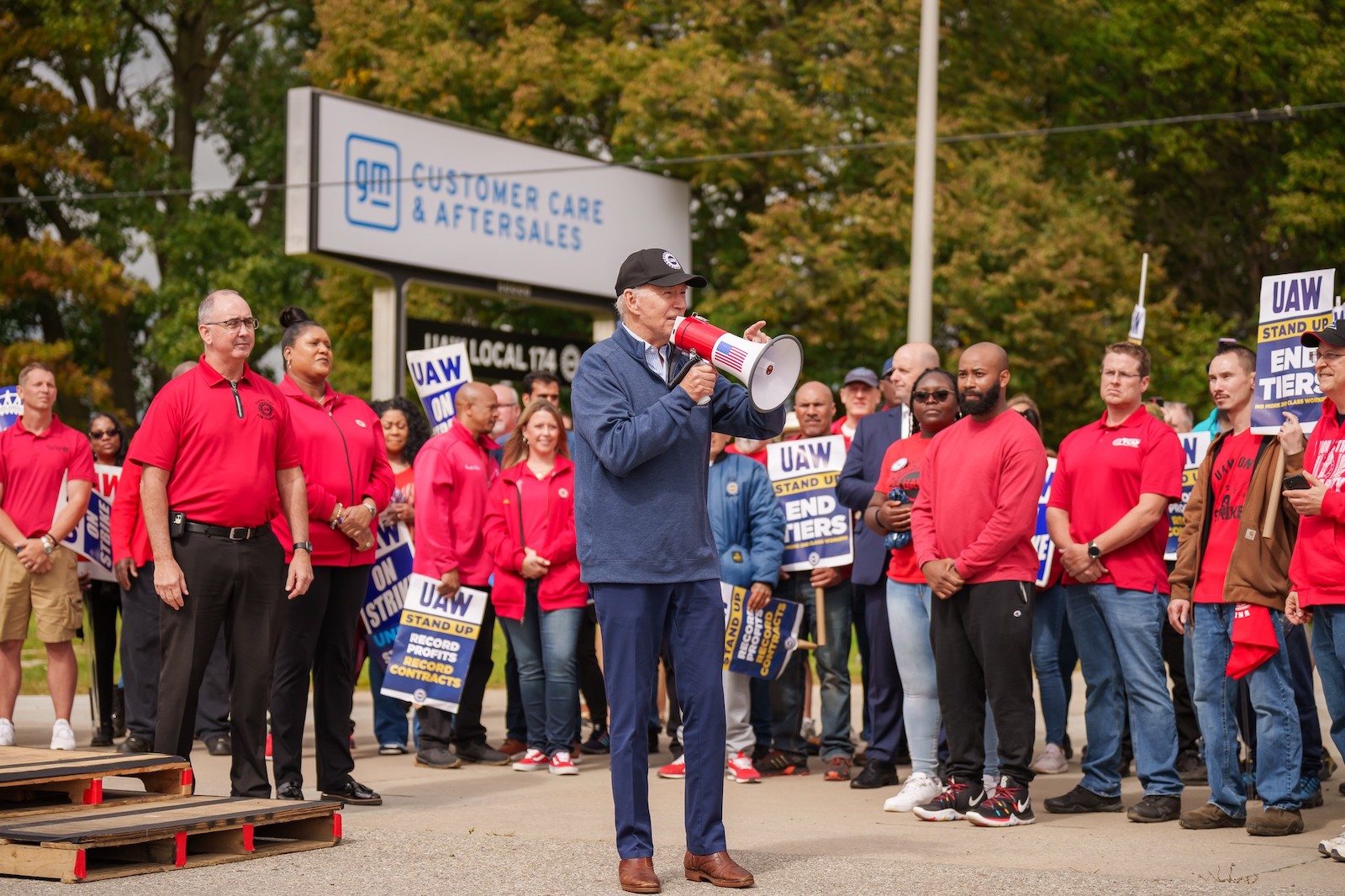The United Auto Workers strike against Detroit’s Three automakers has captured the attention of the nation’s politicians, while underscoring the uncomfortable contradictions in the approaches of both Democrats and Republicans toward the working class, labor unions and transportation.
Meanwhile the UAW is warning it is prepared to expand the current strike, which now covers three assembly plants operated by General Motors, Ford and Stellantis and 38 parts distribution warehouses operated by GM and Stellantis, if progress is not demonstrated by Friday.
Biden pays a visit
President Joe Biden did drop in on the UAW strike Tuesday visiting pickets at a General Motors warehouse, which sits not far from the end of the east-west runway at Detroit’s busy international airport.
Biden’s visit was consequential, however, as the President endorsed demands for a pay increase and other union mandates. For good measure, the President added a distinctly populist tinge to his remarks, by noting, “Wall Street didn’t build this country, the middle class built this country and unions built the middle class,” said Biden, clearly playing up his union ties.
“I think President Biden visiting the picket line is on brand for him,” noted Arthur Wheaton of Cornell University’s Institute of Labor Relations. “It also shows President Biden staying away from bargaining table as requested by both UAW and auto companies to let collective bargaining take its course.
“It lets auto companies know where he stands and could influence future government funding for transition to electric vehicles and potential financing for suppliers being hurt by strike,” Wheaton added.
UAW President Shawn Fain, who until now has refrained from endorsing Biden for President in 2024, accompanied him on his visit to the UAW pickets and praised the President for visiting strikers.
“I think he was well received,” said Fain, who also used a subsequent cable television appearance to criticize former President Donald Trump. Fain said over the years Trump has done nothing to help autoworkers.
UAW blasts Trump
Fain, who has made good use of populist, anti-elitist language noted Trump previously blamed the union for industry’s bankruptcy in 2008, urged automakers to move to non-union locations in 2015 and did nothing to block the shutdown on the GM plant in Lordstown, Ohio when he was President in 2019.
Dave Green, the UAW Regional Director for Indiana and Ohio, noted in a telephone interview Trump even urged workers from GM’s Lordstown plant not to sell their houses after GM announced in 2018 it planned to idle the plant. “Rember that,” said Green, adding Trump did absolutely nothing to stop the closing of Lordstown, which had a huge impact on the surrounding community.
Union officials added the UAW’s demands for a 40% wage increase, a shorter 32-hour work week, the end of the tiered wage structure and the restoration of traditional contract provisions for cost-of-living adjustments and defined-benefit pensions, are designed to compensate for the corporate greed in years since then.

President Joe Biden addresses UAW members walking a picket line at the GM Willow Run Distribution Center, Tuesday, September 26, 2023, in Belleville, Michigan. (Official White House Photo by Adam Schultz)
Up until now, however, Trump has not commented on plants closings or union demands. Instead, he has taken aim at the UAW’s support for electric vehicles. The former President basically says EV don’t work and eliminate the jobs of thousands of union members.
The right-wing critique of EVs was summarized in piece by Liz Peek, a former partner of the Wall Street firm Wertheim & Company.
“This is a difficult situation for all parties, brought on by Biden’s edict that 67% of all cars sold in the U.S. by 2032 must be all-electric. The truth is, Americans are not ready to transition so quickly to electric cars. They see inadequate infrastructure and high prices as near-term obstacles. Further complicating the shift is the probable reliance on Chinese materials to meet EV goals and an electric grid that may not be adequate to the increased demand that will accompany rising EV usage,” Peek wrote in The Hill.
However, Cox Automotive reports EV sales are continuing to grow, and 23% of all new vehicles sold in California, which has set trends in the auto industry for a century now, are EV. Additionally, much of the expert opinion on the slow ramp up of EVs centers around cost and the lack of an adequate charging network needed to support EVs.




0 Comments